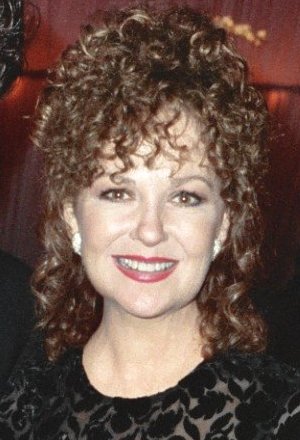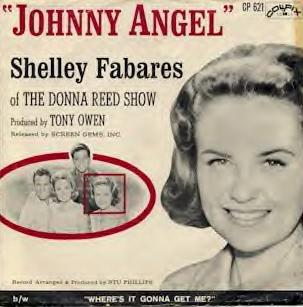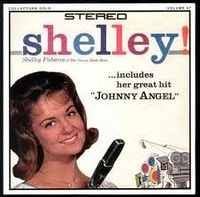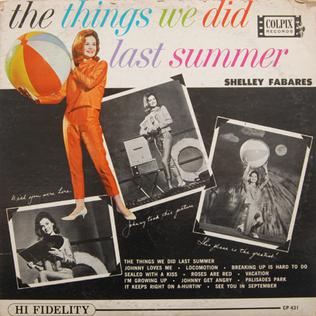
Paul Petersen is an American actor, singer, novelist and activist.

Michele Ann Marie "Shelley" Fabares is a retired American actress and singer. She is known for her television roles as Mary Stone on the sitcom The Donna Reed Show (1958–1963) and as Christine Armstrong on the sitcom Coach (1989–1997), the latter of which earned her two Primetime Emmy Awards nominations. Her film roles include playing the leading lady to Elvis Presley in Girl Happy, Spinout and Clambake.

"True Love" is a popular song written by American songwriter Cole Porter, published in 1956. The song was introduced by Bing Crosby and Grace Kelly in the musical film High Society. "True Love" was nominated for the Academy Award for Best Original Song. Kelly's contribution on the record is relatively minor, duetting with Crosby on only the final chorus. Nonetheless, the single is co-credited to her.
Colpix Records was the first recording company for Columbia Pictures–Screen Gems. Colpix got its name from combining Columbia (Col) and Pictures (Pix). CBS, which owned Columbia Records, then sued Columbia Pictures for trademark infringement over the Colpix name.

"Johnny Angel" is a song written and composed by Lyn Duddy and Lee Pockriss. It was originally recorded by both Laurie Loman and Georgia Lee, but those two versions were not successful. It first became a popular hit single when it was recorded by Shelley Fabares in the fall of 1961; she took it to number 1 on the Billboard Hot 100 Chart when the song was released in 1962. In the same year, British singer Patti Lynn had a moderate hit on the UK Singles Chart with her cover of the song. The American pop music duo The Carpenters recorded "Johnny Angel" in 1973 as part of a medley of oldies on side two of their album Now & Then.
"I'm Beginning to See the Light" is a popular song and jazz standard, with music written by Duke Ellington, Johnny Hodges, and Harry James and lyrics by Don George and published in 1944.
Paul Evans is an American rock and roll singer and songwriter, who was most prominent in the 1950s and 1960s. As a performer, he had hits with the songs "Seven Little Girls Sitting in the Backseat", reaching No. 9 on the Billboard Hot 100 in 1959), "Midnight Special" and "Happy-Go-Lucky Me".

"The Wanderer" is a song written by Ernie Maresca and originally recorded by Dion, released on his 1961 album, Runaround Sue. The song, with a 12-bar blues-base verse and an eight-bar bridge, tells the story of a travelling man and his many loves. The song is ranked number 243 on the Rolling Stone magazine's list of The 500 Greatest Songs of All Time.

Joanie Sommers is an American singer and actress with a career concentrating on jazz, standards and popular material and show-business credits. Once billed as "The Voice of the Sixties", and associated with top-notch arrangers, songwriters and producers, Sommers' popular reputation became closely tied to her biggest, yet most uncharacteristic, hit song, "Johnny Get Angry".
"The Things We Did Last Summer" is a popular song about nostalgia from 1946. The words were written by Sammy Cahn, with the composition by Jule Styne. The most well known version is the 1946 Top ten hit by Jo Stafford. Versions by Frank Sinatra and by Vaughn Monroe also charted that year. Shelley Fabares had a hit cover in 1962 on the pop chart. Several recordings have been made, including versions by Frank Sinatra, Vaughn Monroe, and Dean Martin who recorded different versions for his 1959 and 1966 Christmas LPs.

"My Prayer" is a 1939 popular song with music by salon violinist Georges Boulanger and lyrics by Carlos Gomez Barrera and Jimmy Kennedy. It was originally written by Boulanger with the title Avant de mourir 1926. The lyrics for this version were added by Kennedy in 1939.
Carol Deene is an English pop singer and radio host who achieved success in the early 1960s.

"Sad Movies (Make Me Cry)" is a 1961 pop song by the American singer Sue Thompson. The song was written by John D. Loudermilk and was released as Thompson's debut single, from her Hickory Records debut album Meet Sue Thompson. The song also spawned multiple successful cover versions.

Shelley! is the self-titled debut pop album by singer and actress Shelley Fabares released in 1962 on Colpix Records. It was available in both mono and stereo, catalogue numbers CP-426 and SCP-426. The album was produced and arranged by Stu Phillips and recorded at United Western Recorders in Hollywood, California. Shelley! peaked on the Billboard Top LPs chart at No. 106 in July 1962. The album includes the hit single, "Johnny Angel", which reached number one on the Billboard Hot 100 in April 1962.

The Things We Did Last Summer is the second studio pop album by singer and actress Shelley Fabares released in 1962 on Colpix Records. It was available in both mono and stereo, catalogue numbers CP-431 and SCP-431. The album was produced and arranged by Stu Phillips who had produced her previous record. It peaked on the Billboard 200 Chart at #121 in October 1962. The album features her Top 40 hit single "Johnny Loves Me". It also includes the second hit single from the album, "The Things We Did Last Summer".

"Johnny Loves Me" is a pop single by Shelley Fabares released in 1962 on Colpix Records. It was the first single taken from her second album, The Things We Did Last Summer. "Johnny Loves Me" was a collaboration written by Barry Mann and Cynthia Weil. The single was produced and arranged by Stu Phillips.
"It Keeps Right On a-Hurtin'" is a song written and recorded by Johnny Tillotson, which was a major hit for him in 1962. The song was nominated for a Grammy for Best Country & Western song for 1962 but lost to Burl Ives' Funny Way Of Laughing. It has been recorded by many other artists.
"Send Me the Pillow You Dream On" is a country song written and recorded by Hank Locklin. The song has become a standard for the Nashville sound, and has been covered by pop, country, and bluegrass artists.

"Norman" is a popular song written by John D. Loudermilk. Recorded by Sue Thompson in 1961, the song reached No. 3 on the Billboard Hot 100. The next year, Carol Deene released her version of the song in the United Kingdom, where it reached No. 24 on the UK Singles Chart. A cover version by British singer Carol Deene would be a hit in the UK in early 1962.
"Return to Me" is a song with music by Carmen Lombardo and lyrics by Danny Di Minno. The song was released in 1958 by Dean Martin. Martin recorded the song again in 1961 for his album Dino: Italian Love Songs.












